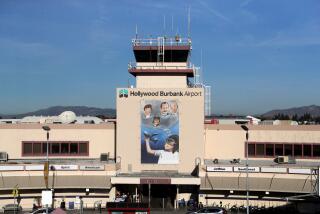Salvaging an Airport Pact
- Share via
Burbank officials have been asking for clarification from the Federal Aviation Administration on whether a framework agreement reached last August to build a long-disputed new terminal at Burbank Airport met federal guidelines. Last week they got an answer from FAA Administrator Jane Garvey: No, it does not.
It was not the answer they were hoping to hear. But that need not scuttle the agreement entirely.
One of the sticking points in negotiations has been the city’s insistence that the airport impose a mandatory nighttime curfew to replace the voluntary one in place now. Federal law prohibits communities from unilaterally imposing noise limits that restrict air commerce; exceptions require a lengthy federal noise study.
The framework agreement attempted to skirt this requirement by shutting down the terminal at night--but not the airport itself. It was a clever maneuver, a de facto curfew, but unfortunately, the FAA says it won’t fly.
That leaves the Burbank Airport back where it started--with an aging terminal that’s too small to serve passengers comfortably and closer to the runways than modern safety standards recommend.
Burbank city officials now say they’ll have to wait out the federal noise study, which could take two years, before agreeing to a new terminal plan. But why? If, after the noise study, the FAA still denies the airport a mandatory curfew, does that mean Burbank will simply not build a new terminal?
Burbank officials won other concessions in the framework agreement, including limiting the new terminal to the same number of gates as the old one. To continue with that plan, keeping the voluntary curfew in place, would leave the city no worse off than it is now--but would give the airport a more modern, efficient and, most important, safer new terminal.
In the meantime, the FAA opinion underscores how pointless are the continued efforts by a group called Restore Our Airport Rights, or ROAR, to put an initiative on the ballot mandating curfews and flight caps.
The ROAR initiative, by ignoring the reality of federal law, holds out no hope of getting a new terminal built. It is a blunt instrument, not the fine tool needed to forge a balance between the needs of air commerce and the needs of neighborhoods.
What is needed now is not an initiative, but someone or some group with initiative--with the leadership skills to get negotiations for the much-needed new terminal back on track.
More to Read
Sign up for Essential California
The most important California stories and recommendations in your inbox every morning.
You may occasionally receive promotional content from the Los Angeles Times.













